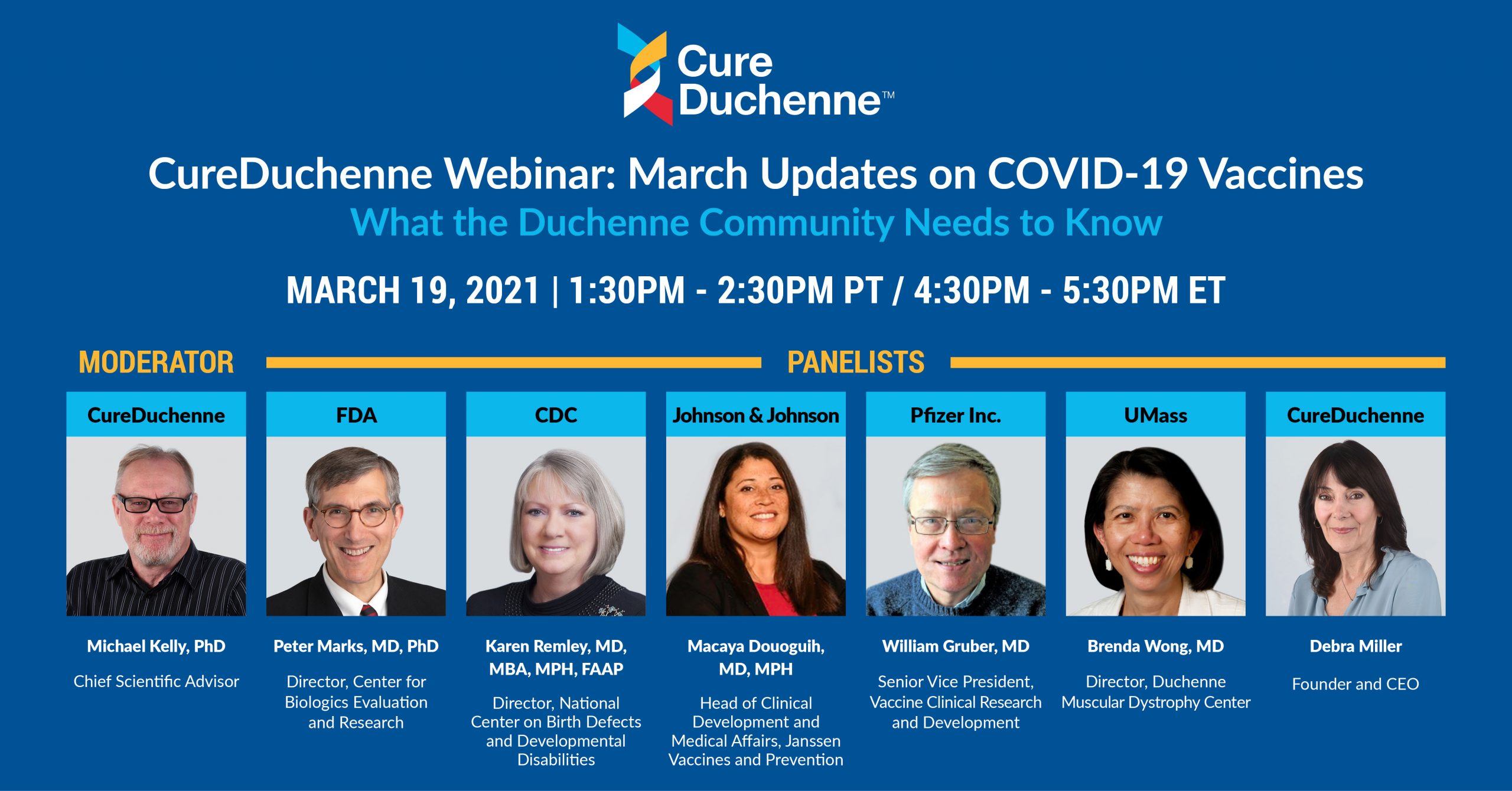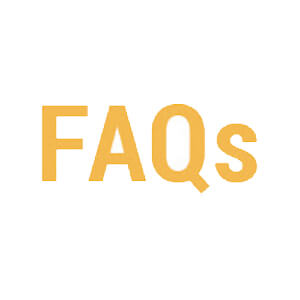CureDuchenne Webinar
March Updates on COVID-19 Vaccines – What the Duchenne Community Needs to Know

This webinar will be a roundtable with scientific and medical experts covering recent updates to COVID-19 vaccines and how they relate to the Duchenne community.
COVID-19 Vaccine Basics
There are many vaccine candidates in development, but currently there are three that have been authorized by the FDA for Emergency Use Authorization in the US:
- Pfizer-BioNTech COVID-19 Vaccine, developed by Pfizer and BioNTech
- Moderna COVID-19 Vaccine, developed by Moderna in partnership with the NIH, National Institute of Allergy and Infectious Diseases (NIAID)
- Johnson & Johnson (J&J)/Janssen COVID-19 Vaccine, developed Janssen, a pharmaceutical arm of J&J, in collaboration with Beth Israel Deaconess Medical Center
| Pfizer–BioNTech COVID-19 Vaccine |
Moderna COVID-19 Vaccine |
J&J/Janssen COVID-19 Vaccine |
|
| Vaccine type | mRNA vaccine | mRNA vaccine | Adenovirus-delivered DNA vaccine |
| Doses required | 2 (3 weeks between shots) | 2 (4 weeks between shots) | 1 |
| Shipment and storage requirements | Must be kept ultracold, -94 degrees Fahrenheit; once thawed must be refrigerated and used within 5 days | Must be kept at -4 degrees Fahrenheit; once thawed must be refrigerated for one month | Can be refrigerated for up to 3 months at 36-46 degrees Fahrenheit |
| Reported efficacy | 95% effective seven days after the second dose | 94% effective fourteen days after the second dose | 66% effective against moderate to severe cases 28 days after single dose, 100% effective in preventing COVID-19–related hospitalization and death |
| FDA (US) Indication | Intramuscular injection (shot) to individuals ages 16 and older to prevent COVID-19 infection | Intramuscular injection (shot) to individuals ages 18 and older to prevent COVID-19 infection | Intramuscular injection (shot) to individuals aged 18 and older to prevent COVID-19 infection |
| FDA Fact Sheet (includes ingredient information) | Download Here | Download Here | Download Here |
| Product Website | Visit Website | Visit Website | Visit Website |
Last Updated: 3/17/2021
The CDC has a helpful explanation of how these COVID vaccines work, as well as information on the Emergency Use Authorization process, all of which can be found here.
Other vaccines that use different types of technology will likely come on the scene in the coming months.
Helpful Links
FDA COVID-19 Vaccines Hub
Johns Hopkins University of Medicine, COVID-19 Vaccines Hub
CDC: The Journey of Your Child’s Vaccine Graphic
CDC: COVID-19 Vaccine Hub
- CDC: Facts About COVID-19 Vaccines
- CDC: Understanding mRNA COVID-19 Vaccines
- CDC: Understanding Viral Vector Vaccines
- CDC: Frequently Asked Questions about COVID-19 Vaccination
- CDC: Benefits of Getting a COVID-19 Vaccine
- CDC: Ensuring the Safety of COVID-19 Vaccines in the United States

Getting Vaccinated
Vaccine administration has started in the United States for individuals ages 16 and older.
Due to limited vaccine supply, the CDC’s Advisory Committee on Immunization Practices (ACIP) is making recommendations for who should get vaccinated first. However, the specifics of who is eligible to receive a vaccination, and on what date, is being managed at the state or local level, and evolving all the time. Therefore, it will be most helpful to visit your state’s Department of Public Health website for the most up-to-date information.
That said, ACIP has recommended individuals ages 16-64 who are at a high risk for severe complications, as well as those who might be at high risk for severe complications, receive early vaccination under Phase-Ic of the roll-out. “Duchenne muscular dystrophy” is not currently listed as a high-risk condition, however, high-risk conditions (outlined here) include many conditions, some of which may be applicable to the Duchenne community: immunocompromised state due to corticosteroid use, obesity, and cardiomyopathy. CureDuchenne wants to remind the Duchenne community that cardiomyopathy is a condition which affects most individuals with Duchenne as well as many female carriers; this should be conveyed to providers when inquiring about vaccine eligibility.
Clinical trials of COVID-19 vaccines for children ages 12-17 have started in the US. Information about Pfizer-BioNTech’s clinical trial in children can be found here, Moderna’s here, and J&J/Janssen’s here. Additionally, Moderna’s trials for children aged 6 months to 12 years can be found here.
Dr. William Gruber, Senior VP of Vaccine Clinical Research and Development at Pfizer, notified the Duchenne community during CureDuchenne’s January COVID-19 Vaccine Webinar that enrollment in Pfizer’s Phase III study for 12-15 year olds was complete. He shared that Pfizer hopes to have the data submitted to the FDA for potential Emergency Use Authorization prior to the start of the 2021-2022 school year, though many steps remain before it can be widely administered in this age group.
Information on testing and availability of COVID-19 vaccines for children under the age of 12 remains to be determined.
This may vary state-to-state.
CureDuchenne encourages you to check the relevant State Department of Public Health website for information about out-of-state resident travel restrictions (such as quarantine periods) and vaccine availability for out-of-state residents, or to contact your neuromuscular provider’s office.
This is, first and foremost, a conversation to have with your doctor or the healthcare provider administering your vaccine.
Individuals who are 16 or 17 years old are currently only eligible for the Pfizer-BioNTech COVID-19 Vaccine. If you are 18 years old or older, you are eligible for either the J&J/Janssen vaccine or the Moderna vaccine.
Other than those age restrictions, it is anticipated that many individuals will not have a choice of vaccine due to the impact of the limited supplies, especially in early phases of distribution. Public health officials are advising individuals to get whatever vaccine they have access to, as all vaccines available via Emergency Use Authorization (EUA) in the US have demonstrated significant benefit in reducing the frequency, severity and mortality of COVID-19 infections.
Yes. The vast majority of clinicians and scientists agree that the drug development, review, and approval processes, as well as the information gained throughout the clinical trials for the COVID-19 vaccines, indicate that the vaccines are safe and highly effective. Trials run by all of the companies employed independent data safety monitoring boards which were tasked with reviewing safety data throughout the trials and prior to FDA submission.
While the development, testing and approval processes for COVID-19 vaccines were rapid, this was due, at least in part, to an unprecedented amount of collaboration between countries, agencies, drug companies, and scientists. Many drug companies also received financial support, through Operation Warp Speed and other avenues, allowing them to focus their efforts on COVID-19 vaccine development without financial setback. Recruitment to clinical trials also proved faster than normal, thanks to the amount of public awareness, and companies ran some of the testing processes in parallel to gather as much information as quickly as possible.
Additionally, mRNA vaccines have been under development since the early 1990s. BioNTech (who partnered with Pfizer) and Moderna, both pioneers in the mRNA field, have been able to use their existing platforms and technology to speed the development of their vaccines.
The J&J/Janssen vaccine comes out of decades of research on adenovirus-based vaccines. The adenovirus is used to deliver the coronavirus protein gene into cells, but the adenovirus has been modified so it cannot make you sick.
This graphic from the CDC helps explain the clinical trial and approval processes for vaccines, as well as three organizations and agencies tasked with monitoring vaccine safety once approved and being administered.
It is important to note, however, that all vaccines carry the risk of potential side effects. Pain and/or swelling at the injection site, fever, chills, fatigue, and headache are some of the most common. As referenced below, there is also a risk of allergic reaction with the vaccines. Its important to discuss these risks with your doctor.
Lastly, the available COVID-19 vaccines cannot give you COVID-19. This is because none of the vaccines use live coronavirus.
Dr. Kathy Mathews, Professor of Pediatrics and Neurology at the University of Iowa, noted during CureDuchenne’s January COVID-19 Vaccine Webinar that the myalgia from vaccination is not typically associated with rhabdomyolysis. “I would not let that fear make you not get it; the risks of COVID[-19] far exceed any risk of muscle injury.”
This is, first and foremost, a conversation to have with your doctor or the healthcare provider administering your vaccine.
The Centers for Disease Control and Prevention (CDC) says, “Due to the severe health risks associated with COVID-19 and the fact that re-infection with COVID-19 is possible, people may be advised to get a COVID-19 vaccine even if they have been sick with COVID-19 before.” This is also true for those who previously had positive antibody tests to COVID-19.
The CDC also says individuals should not be vaccinated against COVID-19 until the acute infectious period is over; those seeking vaccination who have had recent COVID-19 exposure should not do so until isolation/quarantine criteria are complete. Because it appears that immunity to COVID-19 lasts at least 90 days, individuals can (but need not) defer vaccination until 90 days from infection.
Pfizer-BioNTech’s and Moderna’s vaccines are approved for use in individuals who are immunocompromised due to corticosteroid usage. J&J/Janssen encourage individuals to speak with their provider.
The CDC classifies individuals on corticosteroids as being at a potentially increased risk for severe illness from the virus, enabling these individuals to be early recipients of the vaccine. Individuals on immunosuppressive medications were also included in the trials for these vaccines.
Dr. Anthony Fauci, the nation’s leading infectious disease expert and the director of the National Institute of Allergy and Infectious Diseases (NIAID), spoke at a medical conference in December 2020 where he suggested that individuals on immunosuppressive medications may not achieve the same level of immunity from the vaccine, but that any immunity is better than none.
The risk to immunocompromised individuals considering being vaccinated is limited to “live” vaccinations, and per the CDC, none of the vaccines approved for use or in development in the United States contain live virus.
During CureDuchenne’s January COVID-19 Vaccine Webinar, Dr. Hank Mayer, Director of the Pulmonary Function Lab at Children’s Hospital of Philadelphia, said, “There is a potential that the vaccine may not have the same immunogenic response that you would see in somebody NOT on chronic steroids. All we can do is hypothesize at this point because we just don’t have the data.” Dr. Mayer continued, saying, “The very robust tracking that’s being done should allow us to answer some of those questions before we get to the point where vaccination will be open to our patients with Duchenne muscular dystrophy.”
If you have questions about how to time vaccine administration with your steroid dosing, consult your neuromuscular specialist.
This is, first and foremost, a conversation to have with your doctor or the healthcare provider administering your vaccine.
At this time, there is no information to suggest that individuals with an autoimmune condition not get vaccinated. Adults with autoimmune conditions were eligible for enrollment in clinical trials. Additional information from the CDC can be found here.
At this time, children under the age of 16 cannot/should not get vaccinated unless participating in a COVID-19 clinical trial.
Additionally, the CDC also says individuals should not be vaccinated against COVID-19 while they have an active COVID-19 infection, and instead should wait until the acute infectious period is over. Those seeking vaccination who have had recent COVID-19 exposure should not do so until isolation/quarantine criteria are complete. Because it appears that immunity to COVID-19 lasts at least 90 days, individuals can (but need not) defer vaccination until 90 days from infection.
Lastly, the CDC also has information available regarding allergy risk of the vaccines. Individuals who experience an allergic reaction to their first dose of COVID-19 vaccine, and those with a history of allergy to any of the vaccine’s components (such as polyethylene glycol, or PEG) should not be vaccinated. Individuals with a history of severe allergies (but not to components of the vaccine) should discuss with their doctor or vaccine provider prior to being vaccinated. For some individuals, being monitored closely in a provider’s office after administration may be sufficient.
This is, first and foremost, a conversation to have with the clinical trial study team.
Each study sponsor will approach this differently, and in some cases, recent vaccination may affect your eligibility and/or timing of eligibility—for example, some trials do not allow for vaccinations within the 4-week period leading up to treatment.
Some considerations for clinical trial participants include potential drug-to-drug interaction between the vaccine and the investigational agent(s), ability to differentiate side effects of a vaccine from the investigational agent(s), and a vaccine’s role on an individual’s immune system. Because these answers vary based on the individual and the trial/investigational agent(s), do not proceed with vaccination until you have discussed with your clinical trial investigator or other study staff.
This is, first and foremost, a conversation to have with the clinical trial study team.
Most exclusion criteria regarding vaccinations are short-term, meaning recent vaccinations (usually within a 4-week period) may affect an individual’s eligibility. Many trials also include instructions on what, if any, vaccinations can be administered once an individual is participating in a trial.
Few trial sponsors have yet released comprehensive information regarding COVID-19 vaccination affecting eligibility or participation, however Sarepta has posted a bulletin outlining their decisions.
Many families are concerned that being vaccinated against COVID=19 may affect their ability to participate in future gene therapy trials due to potential impact on neutralizing antibodies. Sarepta posted a bulletin which clarifies information on mRNA vaccines and AAV gene therapies. A few important details from their bulletin:
- There is currently no evidence to suggest that an mRNA-based COVID-19 vaccine (like Pfizer-BioNTech and Moderna’s) would cause an increase in neutralizing or total antibodies against adeno-associated virus (AAV). The antibodies an immunized individual would develop would be against this particular strain of coronavirus, not AAV—the two viruses are unrelated.
- Both the J&J/Janssen vaccine and the Oxford-AstraZeneca vaccine candidate use adenovirus vectors. Adenovirus (AV) and adeno-associated virus (AAV) are not the same virus; there is currently no evidence to suggest that receiving an AV-based vaccine would affect total or neutralizing AAV antibodies.
- Additional vaccines and treatments using AAV vectors are under development; these may affect an individual’s total or neutralizing antibody levels to AAV, which may impact eligibility to participate in future gene therapy trials. It is worth noting that currently, none of these projects are undergoing human clinical trials in the US. CureDuchenne will provide additional information as it becomes available.
In addition to checking with the study team, you can review the clinical trial information posted on clinicaltrials.gov and check our COVID-19 Duchenne Industry Announcements page for updates.
Understanding the Vaccine’s Role in the Pandemic
Yes, though maybe not immediately.
Think about the annual flu vaccine: the US makes a big push for as many Americans as possible to get vaccinated in order to reduce an individual’s risk of contracting the flu, but also in order to reduce the nationwide case count and to protect those who can’t get vaccinated. This is called herd immunity, a term used to describe a situation when the virus can no longer spread rapidly because of the number of people with immunity to it. (One other way to reach herd immunity is to let the virus run rampant through communities; some countries and municipalities, including Sweden, initially opted for this approach, though most have since abandoned it in favor of stricter precautions).
Experts aren’t sure what percentage of Americans or global citizens will need to be vaccinated against COVID-19 for herd immunity, or when we will reach this point. Given how contagious COVID-19 is, it is expected that about 70% of the national population will need to have been infected or vaccinated in order to reach herd immunity.
Simply put, vaccines don’t save lives—vaccinations do. The CDC said,as of March 4, 2021,about 54 million Americans of our nationwide total 328.2 million—roughly 16.3% of the national population—have received 1 or more doses of the available COVID-19 vaccines. (Only 8.4% of the population has received 2 doses).
Yes.
Although scientists need more time to determine whether those who have been vaccinated can be “silent spreaders” of COVID-19, in March, 2021 the CDC published their Interim Public Health Recommendations for Fully Vaccinated People.
Fully vaccinated people can:
- Visit with other fully vaccinated people indoors without wearing masks or physical distancing
- Visit with unvaccinated people from a single household who are at low risk for severe COVID-19 disease indoors without wearing masks or physical distancing
- Refrain from quarantine and testing following a known exposure if asymptomatic
For now, fully vaccinated people should continue to:
- Take precautions in public like wearing a well-fitted mask and physical distancing
- Wear masks, practice physical distancing, and adhere to other prevention measures when visiting with unvaccinated people who are at increased risk for severe COVID-19 disease or who have an unvaccinated household member who is at increased risk for severe COVID-19 disease
- Wear masks, maintain physical distance, and practice other prevention measures when visiting with unvaccinated people from multiple households
- Avoid medium- and large-sized in-person gatherings
- Get tested if experiencing COVID-19 symptoms
- Follow guidance issued by individual employers
Follow CDC and health department travel requirements and recommendations
Individuals who get vaccinated receive a COVID-19 vaccination card, with proof of vaccination. At the moment, these are used to help ensure individuals receive both doses of their vaccine at the correct intervals, and to help with tracking of administration.
Historically, some countries have used immunity passports to limit travelers to only those with vaccination history against diseases like Polio. The current vaccination card being supplied by the CDC is not the same as an immunity passport.
It remains unclear whether countries, airlines, states, schools, or companies will limit activities based on COVID-19 vaccination status.






